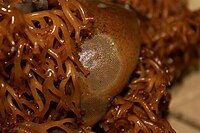Macrocystis integrifolia
| Macrocystis integrifolia | |
|---|---|
 |
|
| Macrocystis integrifolia | |
| Scientific classification | |
| (unranked): | SAR |
| Superphylum: | Heterokonta |
| Class: | Phaeophyceae |
| Order: | Laminariales |
| Family: | Laminariaceae |
| Genus: | Macrocystis |
| Species: | M. pyrifera |
| Binomial name | |
|
Macrocystis integrifolia Bory de Saint-Vincent 1826 |
|
| Synonyms | |
|
Macrocystis pyrifera (Linnaeus) C. Agardh |
|
Macrocystis pyrifera (Linnaeus) C. Agardh
Macrocystis integrifolia is one of four species of kelp (large brown algae) in the genus Macrocystis which grows to about 6 metres (20 ft) long.
Deep brown color on flattened rhizomes which are profusely dichotomously branched. Each is attached by branched root-like structures coming out of the sides of the rhizomes. Slender main stipes (about 1 centimetre (0.39 in) wide to 30 metres (98 ft) long) come from the rhizome which is up to 0.1 metres (3.9 in) at the widest. Periodically 5 centimetres (2.0 in) wide and 35 centimetres (14 in) long flattened leaf-like branches derive from the stipe. They have furrowed surfaces and taper gradually, but then have an oval or rounded float where attached to the stipe. The blade-like branches have notched denticulate edges leading to the terminal blade at the tip of the stipe, which is separated by several smaller branches.
It is found on intertidal rocks or shallow subtidal rocks along the Pacific coast of North America from (British Columbia to California). It prefers water about 7 metres (23 ft) to 10 metres (33 ft) deep and exposed to the open sea and normal salinities, yet sheltered from full wave action.
Macrocystis integrifolia alternates heteromorphic phases from a macroscopic sporophyte to dioecious microscopic gametophytes. It has been studied as a plant fertilizer, increasing bean yields up to 24% and chemical studies indicate presence of phytohormone-like substances.
In 2009, a study determined that this and Macrocystis pyrifera may be the same species.
...
Wikipedia
